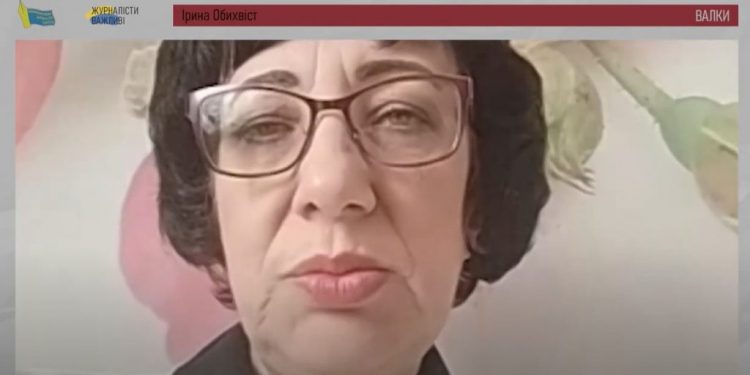Iryna Obykhvist, the editor of the rural newspaper Sils’ki Novyny (Kharkiv region), shared with journalists from the National Union of Journalists of Ukraine how phone calls from readers motivated her to continue publishing the newspaper during the full-scale war.
There’s no point in publishing the newspaper because it won’t be delivered – this was the challenge Iryna Obykhvist, the editor of the rural newspaper Sils’ki Novyny, faced at the start of the full-scale war. The postal service refused to operate due to shelling, and Balakliya – the city where the newspaper was printed – was occupied.
— Before the full-scale invasion, we were publishing weekly on 8, 10, and 12 pages – it depended on the content— Ms. Obykhvist begins her story. After the invasion started, there was a sense of overwhelming confusion in the first few days: what to do? There’s no place to print, the postal service isn’t working… I stayed home for a few days, watched TV, and surfed the internet. And I realized my mind couldn’t handle reliving everything if I didn’t do anything. So, I went to work – to help at the city council.
A few days later, Iryna entered the editorial office and picked up her work phone. It was flooded with missed calls from readers.
— I called back a few of them – people had many questions they couldn’t answer. I called the journalists to work, and we agreed to take shifts. We worked like this for a month. And then we realized that people still needed the newspaper.
The postal service wasn’t operational then, and Balakliya was occupied. Still, they found a solution: they started creating the newspaper online and sending it to readers’ email addresses. They announced this on social media and established this working format in two to three weeks. They had more than fifteen hundred readers.
— Later, when the postal service resumed in our community, we started looking for a place to print. We thank our colleagues from Lutsk – they helped us with this, and the postal workers were accommodating. So, we resumed the newspaper with four pages. We can’t do more for now… because printing became more expensive, and postal services also became more costly. Also, due to the war, not everyone who wanted to can afford to subscribe to the newspaper. And in villages, there’s a delivery issue. After switching to mobile postal units, people complain that postal workers sometimes deliver the newspaper once a month. That means they collect four issues and deliver them,— Ms. Obykhvist explains. She is glad that the publication, even with a delay, still reaches the hands of readers. The editorial team sought financial assistance from various international organizations for this reason.
— The Media Business Association was the first to extend a helping hand to us; they offered us a grant on simple terms. We fulfilled the conditions and received our first assistance. Then we started searching for grant proposals ourselves. The Journalists’ Union also supported us – both financially and morally. For this, we are greatly thankful. Because during this time (and especially then), it was important to understand that you’re not alone and that people in Kyiv also care about us. By the way, nobody from our editorial team left; we continue to live in our Valkivska community and work for our fellow townspeople,— the editor says.
The community, according to Iryna, remains an island of relative calm. If there are airstrikes, they happen in Kharkiv, 50 kilometers away from Valki. They can sometimes hear them when they are closer.
— Fortunately, in our community, only three such incidents have occurred. But they cut off the electricity when Kharkiv is shelled: both there and here. But, well… we’re surviving, that’s it. For many people, it’s worse,— Ms. Obykhvist continues. —Before the invasion, we had a population of 28,000. And now, 23,000 more have come. This puts a strain on the community’s entire infrastructure. More people, more vehicles. The Polish program is operating in our community, allowing us to involve IDP [internally displaced persons] in landscaping work. And funds are paid through this program. Regarding accommodations – almost all communal institutions that could take in refugees are now occupied. People are slowly starting to buy housing. So, life goes on. And journalists are important in it!
This series, titled Executed Free Speech, is created as part of a project Drawing Ukrainian And International Audience’s Attention To Serious Violations Of Human Rights And Crimes Against Journalists And Mass Media By The Russian Federation, which is performed by the National Union of Journalists of Ukraine, with support from the Swedish non-profit organization Civil Rights Defenders.
JOURNALISTS ARE IMPORTANT. Stories of Life and Work in Conditions of War is a cycle of materials prepared by the team of the NUJU with the support of the Swedish human rights organization Civil Rights Defenders.
#CRD

 THE NATIONAL UNION OF
JOURNALISTS OF UKRAINE
THE NATIONAL UNION OF
JOURNALISTS OF UKRAINE
















Discussion about this post